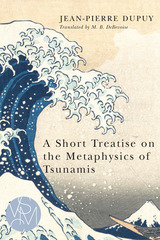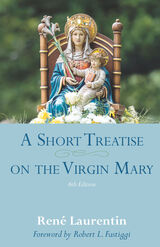2 books about Short Treatise

A Short Treatise on the Metaphysics of Tsunamis
Jean-Pierre Dupuy
Michigan State University Press, 2015
In 1755 the city of Lisbon was destroyed by a terrible earthquake. Almost 250 years later, an earthquake beneath the Indian Ocean unleashed a tsunami whose devastating effects were felt over a vast area. In each case, a natural catastrophe came to be interpreted as a consequence of human evil. Between these two events, two indisputably moral catastrophes occurred: Auschwitz and the bombing of Hiroshima and Nagasaki. And yet the nuclear holocaust survivors likened the horror they had suffered to a natural disaster—a tsunami.
Jean-Pierre Dupuy asks whether, from Lisbon to Sumatra, mankind has really learned nothing about evil. When moral crimes are unbearably great, he argues, our ability to judge evil is gravely impaired, and the temptation to regard human atrocity as an attack on the natural order of the world becomes irresistible. This impulse also suggests a kind of metaphysical ruse that makes it possible to convert evil into fate, only a fate that human beings may choose to avoid. Postponing an apocalyptic future will depend on embracing this paradox and regarding the future itself in a radically new way.
The American edition of Dupuy’s classic essay, first published in 2005, also includes a postscript on the 2011 nuclear accident that occurred in Japan, again as the result of a tsunami.
Jean-Pierre Dupuy asks whether, from Lisbon to Sumatra, mankind has really learned nothing about evil. When moral crimes are unbearably great, he argues, our ability to judge evil is gravely impaired, and the temptation to regard human atrocity as an attack on the natural order of the world becomes irresistible. This impulse also suggests a kind of metaphysical ruse that makes it possible to convert evil into fate, only a fate that human beings may choose to avoid. Postponing an apocalyptic future will depend on embracing this paradox and regarding the future itself in a radically new way.
The American edition of Dupuy’s classic essay, first published in 2005, also includes a postscript on the 2011 nuclear accident that occurred in Japan, again as the result of a tsunami.
[more]

A Short Treatise on the Virgin Mary
Rene Laurentin
Catholic University of America Press, 2022
As a peritus at Vatican II and by the end of his life arguably the world’s leading Mariologist, René Laurentin has earned the privilege of republication of a work of considerable value for any theologian who aims for comprehensiveness of Catholic theological perspective, historically and systematically. Laurentin’s orthodox, yet highly original treatment displays his command of all of the relevant biblical, patristic, medieval and modern texts up to and including the entire proceedings of the Second Vatican Council, as well as the whole range of related historical and theological scholarship. His proposal to pursue Mariological speculation along two tracks – first, “from above,” following the course of doctrinal development from biblical revelation to the VCII era, and second, “from below,” considering Mary’s own life (walking in her footsteps, as it were), from before the Annunciation to the Parousia – provides a clear, accessible structure for the work, yielding rich theological and spiritual fruit. Not only are all the major Marian doctrines and their developments handled with the greatest sensitivity, from the Virgin birth to the modern promulgations of Immaculate Conception and Assumption, but Laurentin’s approach in his second part opens the way to a human-psychological treatment of motherhood, still solidly bolstered by traditional Christian anthropology. Regarding Mary’s status as Mother of God, Laurentin’s discussion of the Theotokos exhibits his deep ecumenical commitments, as much as his specific attention to Mary’s soteriological role as a sticking point for Protestantism. One of the most striking qualities of the work is Laurentin’s deft integration of his evident scholastic formation into an overarching vision thoroughly at ease with the phenomenological (“personalist”) and existential currents in which he also inevitably swam throughout his education and professional scholarly occupation. As a result, the work can be read and appreciated instinctively, as it were, as much by the eclectic contemporary theologian, influenced by the likes of Heidegger, et al, as by the Thomist.
[more]
READERS
Browse our collection.
PUBLISHERS
See BiblioVault's publisher services.
STUDENT SERVICES
Files for college accessibility offices.
UChicago Accessibility Resources
home | accessibility | search | about | contact us
BiblioVault ® 2001 - 2024
The University of Chicago Press









